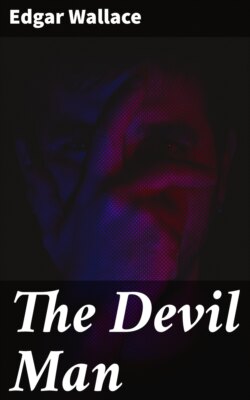Читать книгу The Devil Man - Edgar Wallace - Страница 11
На сайте Литреса книга снята с продажи.
CHAPTER IX
ОглавлениеTable of Contents
Half an hour later Peace left the house, driving back through the silent country lanes and the deserted streets of Sheffield with a sense of importance that he had never experienced before. He was going to prove himself an expert craftsman.
He was in bed by four o'clock, up again at eight in his dingy little work room, littered with gluepots and frame mouldings. He selected his tools with the greatest care, and left by the last train that night for Manchester with a pleasing sense of his own exalted value.
Nor had the day been spent idly. Dyson he located and observed: a tall, thin, querulous man, who spoke occasionally with an American accent, in the manner of Englishmen who have lived in the United States. Peace wondered what the wife was like, and hoped that she was a lady. He had a weakness for real ladies who wore rings and silk dresses and scented themselves lavishly.
He reached Manchester late at night, and was slipping through the barrier when a commanding voice hailed him.
"Hi, come here!" He turned with a scowl, and, recognizing the military-looking man in the long ulster as a member of the Manchester police force, he went towards him with an ingratiating smile.
"What are you doing here?"
"Why, inspector, who'd have thought of seeing you? This is a joyful surprise!"
"You look happy about it." said the other sarcastically. "You were in Manchester two nights ago."
Peace shook his head. "No, sir, I was here last week; I'm doing a bit of business."
"Somebody cracked a nice little crib in Victoria Park. Was that the business?"
The eyes of the ugly little man opened, his big mouth drooped. "Me, sir? I'm going straight now! No more of the narrow path that leadeth to destruction, as the Good Book says. No, sir, I've got a trade of my own—I'm picture-framing, making a living. What I say is, thank Gawd I've got a trade in my hands! People come to me and say: 'Charlie, come and help crack a crib,' but I'll have nowt of it. I've seen prison for the last time, inspector. It's a mug's game."
"How long are you going to be in Manchester?" interrupted the sceptical police officer.
Peace hesitated. "A couple of days. I'm trying to get a contract from one of the big firms."
"Where will you be staying?"
This time without hesitation Peace gave an address: one of the three lodgings he used, but not that at which he had stayed on his previous visit.
"Come into the station inspector's office," said the police officer abruptly.
He pushed the man ahead of him until they came to a tiny, ill-lit room with a desk and a couple of chairs.
"Now let's have a look inside that bag of yours," he suggested.
Meekly the little man opened the big carpet-bag he carried, and the inspector pulled out a few articles of clothing. Beneath these was an assortment of picture frame mouldings and such tools as were proper to the craft Peace was following.
"That's a nice, handy-looking chisel. And what do you want a centre bit for?"
"I'm a joiner," said Peace. "There's a gimlet there, too." The inspector looked at the chisel; it was broad, sharp, an instrument of tempered steel that could be used for the carving of wood, but would also make an effective jemmy to force a window. But there, also, were the samples of mouldings. Peace never travelled without them. They were the articles which cancelled out the instruments of his trade, his sure defence in case of arrest on suspicion.
The inspector threw the tools back into the bag and did not attempt to disguise his disappointment.
"Have you got a shooter?" he asked.
"A what, sir?" Peace was amazed and hurt. "You don't mean firearms, do you, sir? Good Gawd, I've never heard of such things! I wouldn't dare carry one, I'd be afraid of it going off."
The tall inspector in the ulster looked at him straightly. "If anything's cracked while you're here, Peace, we shall pull you in. By the way, what are you calling yourself now, Ward or Peace?"
"By my own name, sir—Charles Peace, the same as I was christened by according to law and the Gospel." He hurried with his bag from the station, got on to a 'bus and was driven two miles. He lodged in a dingy little house in a street remarkable for its griminess. Not until he was in the privacy of his own room, with the blinds drawn down, did he take off his hard felt hat and remove from the webbing that held it the snub-nosed little revolver with the leather wrist-band. He broke the pistol, carefully examined the old-fashioned pin fire cartridges, and put the revolver under his pillow.
He did not go out that night, but spent the evening carving the head of a cherub; he had begun the work in Sheffield and designed it as a present for the lady of Brinley Hall, or, alternatively, for the pretty nurse. He was an opportunist, though he had never heard the word.
